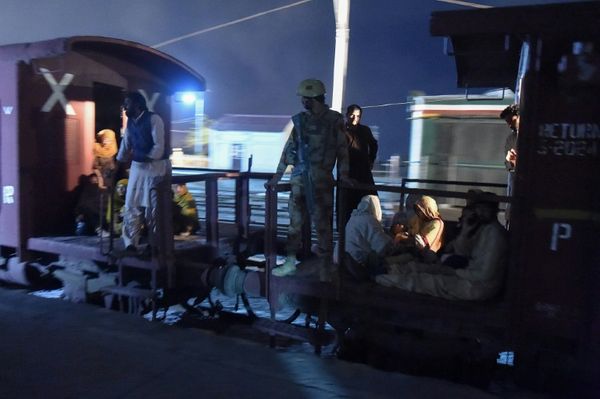
Stamford Bridge was a crisp, clear, boisterous place at kick-off in this last-16 first leg, the air crackling with a comforting midweek energy under those low white lights. And for the next 90 minutes two things happened.
First up there was that unavoidable sense of wider turmoil. What a strange, fraught occasion this was for the world’s most guilelessly weaponised sport, another turn as the hot dog seller in the background of history, a bumbling tourist on the front line of world events.
At lunchtime Roman Abramovich’s name had been bandied about the houses of parliament, the British prime minister insisting (incorrectly, it was later withdrawn) that sanctions were already in operation against Chelsea’s owner. By late evening this had been translated through the lens of midweek football into a meeting of English and French champions in the Gazprom-sponsored Uefa Champions League, with an unavoidable sense of interlocking fingers entwined around this occasion.
In the middle of which, as ever, a game of football broke out. Geopolitical tensions may come and go. But we will always have neat, tactically astute Chelsea Champions League knockout victories. And from a certain angle this was almost a parody of the form: clean sheet, set-piece goal, N’Golo Kanté breakaway, good hustle, nice patterns, Thomas Tuchel on his feet having an ongoing, deeply personal argument with his disobedient invisible twin.
Chelsea were excellent in many ways, a team working in sync and offering by the end the clearest demonstration – in his absence – of what exactly is eating Romelu Lukaku. Tuchel lined up his team with seven essentially defensive outfield players here and a Pulisic-Ziyech-Havertz front three that did not so much scream goals as whisper it very quietly through the sleeve of a heavy woollen jumper.
By 79 minutes he had used four subs, none of whom was Lukaku. Timo Werner was out there, wheeling around like a runaway shopping trolley. But Werner also works like a mad thing in deep areas. It took him eight minutes to make it to seven touches.
Tuchel said after the game that he left Lukaku out because he was tired. What was most notable was how utterly out of kilter with the rest of this team he looks these days. Here Christian Pulisic and Kai Havertz worked like Trojans in attack, running not just the channels but every channel, shuttling up and down the pitch utterly in tune with the collective effort.

It was Havertz who made the difference early on, when he seemed to have a kind of invisibility cloak, penetrating the sovereign borders of the Lille six-yard box three times in quick succession. The last of these saw him force the corner from which he opened the scoring on eight minutes with a nicely timed run and a header. It is easy to forget how young he still is. In outline he has every attribute, from that compelling rangy stride, a footballer who looks as though he has strayed on to the pitch from some passing student charity half marathon, to the relentless ghosting movement.
With 67 minutes gone he was back by his own corner flag, blocking off a forward run, hustling a Lille throw-in, doing deep, tactical, textural things. He is perfect for Tuchel, too. Chelsea’s manager wants control above all. Here he leapt up repeatedly, skinny ankles pounding the touchline, arms describing unknowable geometric shapes in the air.
The thing that gets him most is failed turnovers, an inability to bite in at the right moment. And it was from there that the second goal came, made by the master of the creative turnover, and the game’s best player on the night.
Kanté took the ball in the centre circle, saw a sliver of green and surged away, still so wonderfully light across the turf, then played the perfect pass at the perfect pace to Pulisic. His finish was expertly taken, garland to a fine, energetic performance.
And that was pretty much that. There was time for Tuchel to have another tantrum on the touchline, hands thrashing at the air like a man being menaced by a swarm of crows. At that precise moment Chelsea were funnelling the ball about at the back, the game at a standstill. But Tuchel had seen lines, shadows, peril, misaligned objects.
This is the level of precision he demands, the level of control freakery. Tuchel might have feigned mild surprise at those seven Lukaku touches against Crystal Palace but he sees all this stuff, just as he must also see his own inability to change that script, or to wring any more from this £90m asset. Leaving Lukaku out here was abrupt and to the point. Chelsea will surely march on from here, but it is hard to see how a performance so tight, so uniform in tone and texture leaves any space for that oddly misaligned record signing. These are the moments that clarify teams, seasons, relationships. This one does not look sustainable.







